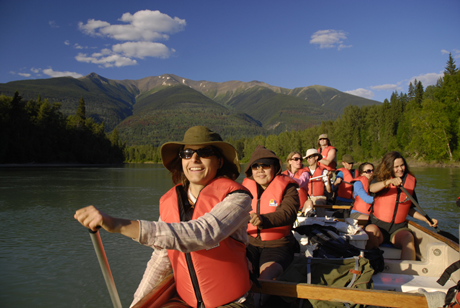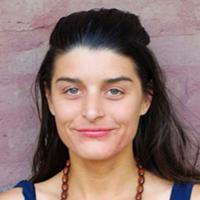
In 1995, Fin Donnelly swam the length of the Fraser River for the first time.
At one point, nearly hypothermic, doubting his ability to continue the 1400-kilometre journey, Donnelly reached out and touched a salmon.
"Making that connection gave me the clarity of vision of why I was doing what I was doing," says Donnelly.
His vision was to spread the word about salmon, stewardship and sustainability in communities along the Fraser and across B.C.
He received a smattering of local press that year for his remarkable feat, but in 2000 when he swam the river for a second time, something changed.
People were there to greet him when he stopped at towns along the way. They had heard of him and were excited about his mission.
For Donnelly, it was proof that his message was getting through. And if he could serve as a river ambassador, why not others?
In 2002, Donnelly launched the Sustainable Living Leadership Program (SLLP) with funding from the Rivershed Society of B.C. That year, the SLLP graduated its first seven participants.
In August 2008, I joined the fifth group to go through the program. Together we travelled the length of the Fraser River, a three-week journey from source to sea.
We were 12 people altogether: eight participants, three facilitators, a videographer and myself. Our purpose was to see first-hand how British Columbians live and work on the Fraser, and gain a better understanding of how people, land and rivers are connected.
What we learned along the way -- complex, compelling, and vital to the fate of British Columbia's people and ecology -- I will be sharing with you in a series of articles to run Wednesdays here on The Tyee.
A free-roaming classroom
Travelling by foot, van, canoe and raft, we started in Mount Robson National Park -- the glacial source of the Fraser headwaters -- and finished at Jericho Beach in Vancouver, just inland from where the main stem pours into the Pacific.
Our classroom was the ever-changing landscape of the river, from lush inland rainforest, to arid desert canyons, to the fertile tidal flats.
Our teachers were our facilitators -- Donnelly, Doug Radies and Glenda Newsted -- and the many people we met along the way: ecologists, farmers, fishermen and guides.
All of them spoke of their own connections with the land and water, and of the paradigm shift that is happening in themselves and their communities.
Brenda Beckwith, an ethno-ecologist who would join us for the final leg of the trip, described this shift in the context of her work in habitat restoration.
"We used to pick through old journals, photos and newspaper articles to get a snapshot in time of a certain place," she explained. "Then we would try and recreate that snapshot."
"We now know that's impossible -- we have no idea how to engineer an ecosystem. Now we look at ecological fidelity."
This is like the promise of faith exchanged at the altar, Beckwith explained. Simply put, it means understanding the capacity of our ecosystem, and operating within it.
'We're trying to localize our life'
Gary and Wendy Lowe take this concept of fidelity to a whole higher level.
They own Twin Meadows Farm, an idyllic 350 acres nestled in the Robson Valley on the banks of the Fraser.
This is where the first leg of our journey ends after four days through the Robson Valley in a 34-foot canoe called the Cedar Spirit.
We've eddied out on a stone beach adjacent to the property. Soon Doug will meet us here with the van, and we'll make our way to Soda Creek, where we'll get back on the water in a raft.
While we wait, Gary comes down to chat. He's wearing his work attire: jeans, grey T-shirt and a white cowboy hat. We're strangers to him, but he invites us to stay the night if (God forbid) our ride doesn't show up.
"Being organic is very important to us, it's an extension of our life," he says.
He and Wendy are working towards a zero-input farm, he tells us, meaning that nothing, not even seeds, will be imported from elsewhere. With any luck, they will even breed their own resident bee populations.
"We're trying to localize our life here as much as possible... we see this as our own little micro-world."
Perhaps it's easier to make sustainable choices within such a micro-world. Yet, even in own group, we struggle with how our behaviours and decisions would affect our own campsites and those downstream.
We try to leave as little trace as possible wherever we go. Arriving at a site, one of the first tasks is digging a pit toilet or setting up the 'honey pot' -- a portable toilet we carry down the Fraser Canyon -- in a spot with the best view.
Leaving a site, we pack out all waste, including organics. The fire is to ash and the camp swept of anything that wasn't there when we arrived. Still, we ask one another around the campfire, could we be doing better?
One evening, at one of our few two-day stops of the trip, a participant confesses to having washed dirty clothes upriver.
Now she has seen traces of a whitish film lapping up on our beach, and feels guilty.
I, too, have brought my dirty clothes and CampSuds down the river tonight, but the soap is biodegradable. That's okay, right?
Wrong. The biodegradable stuff needs to filter through earth before it will completely break down.
Glenda tells us not to beat ourselves up and offers a quote from Maya Angelou: "We do the best we can with what we know, and when we know better, we do better."
Among the beleaguered salmon
If only things were that simple. The Fraser is part of a system extending far out into the Pacific. When salmon farms first arrived in the 1990s in the Broughton Archipelago, they seemed like a good economic solution for the depressed communities there.
But over the next decade, scientists started to see links between fish farm operations and deadly sea lice infestations among wild salmon populations.
The knowledge is there; but still provincial and federal governments ignore recommendations to ban or limit open-net fish farming.
Midway through the trip, some DFO officers visit our camp to demonstrate seine netting. Dragging the 15 by 2 metre net through the shallow eddy, they get a sampling of the species and size of young fish resting and feeding here.
They open up about their work, communities and love for the river. The subject of fish farms is a touchier subject for them.
"DFO's official role is to support the aquaculture industry and help develop it and promote it and ensure that it's not to the detriment of other species," says Roy Argue, a community advisor.
Guy Scharf, a habitat specialist, is glad he's not in the Broughton, but says there are problems in the Interior as well.
Here, says Scharf, some salmon spawning streams have dangerously low water levels, the result of over-irrigation.
"But it's the province that gives out irrigation licenses," he says.
"DFO is in charge of the fish, but we don't regulate the land and the water... it provides a grey area for habitat protection."
A swirling current of choices
It's humbling to sit on a sand bar in the Fraser Canyon, under a full moon in a clear sky.
Our little circle around the campfire is dwarfed by 400-metre-high canyon walls. With the moonlight reflected off these walls, it's bright enough to have a game of Frisbee at midnight.
The Fraser River today is a trickle compared to what it must have been when it started carving out its path through the interior plateau 24 million years ago.
On this scale, all human existence is like one grain of sand on this entire beach; as if our little green choices make any difference in the grand scheme of things.
On a smaller scale, a couple of generations, we will have to deal with the unravelling of our ecosystem. More people will vie for fewer resources.
Our discussions about healthy and secure food, air and water supplies often quickly turn political. We can buy local and organic food, carry it home in cloth bags, but only policy-makers can ban plastic and pesticides.
'From consumer to conserver'
This particular group is one of the most politically savvy he's had, Donnelly tells me later. But that's not the focus of the program.
"If outreach can be focused on changing public policy, then great," says Donnelly. "But what often happens when you're focused specifically on the issues, is that you fight the issues, it's a win or lose and then things fizzle.
"What I would like to see is a solid foundation built where we're moving towards shifting the world view from a consumer paradigm to a conserver paradigm."
We are all connected, and we must use resource wisely. It's a simple message, but until people truly understand and accept this, sustainability is nothing but a buzzword.
Next Wednesday: At the Fraser's headwaters. And the promise and limits of eco-tourism in BC's greatest watershed.
Related Tyee stories:
- Salmon Kills and the Politics of Mining the Fraser
BC's hunger for gravel is voracious. - The Coming Catastrophe
Fail to fortify Fraser dikes, and BC could wake up to a weather nightmare. - BC Salmon Future in Hot Water
Climate change + pine beetle = trouble for Fraser sockeye.
Read more: Travel, Environment
















Tyee Commenting Guidelines
Comments that violate guidelines risk being deleted, and violations may result in a temporary or permanent user ban. Maintain the spirit of good conversation to stay in the discussion.
*Please note The Tyee is not a forum for spreading misinformation about COVID-19, denying its existence or minimizing its risk to public health.
Do:
Do not: